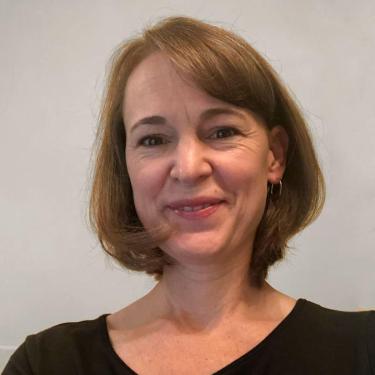
Our Woman of the Week is Alexandra Sedor, nominated for her work as a librarian in the public sector. You see her here with her latest goddaughter, with her husband Joe and Fr. Gregory Safchuk in June 2021 in St. Mark’s church in Bethesda, Maryland, and in Maine with her family, husband Joe, and children John, Lizzie, and Matthew in Acadia National Park in the summer of 2021. We asked her to tell you about how she became a librarian:
“I grew up living on the campus of St. Vladimir’s Seminary, where both my parents worked. There were aspects of growing up on campus that were an absolute blessing. For example, being completely enmeshed in the daily liturgical life of the church is something I really miss now, as a parishioner living 45 minutes from my parish. My friends lived next door to me; all the kids on campus grew up as a pack. Those are experiences that I would not trade for anything: I still have relationships with those families to this day. But like everything in life, it was not black and white. At the time, my father–Father Tom Hopko–felt more called to teaching, but eventually, he was also asked to do a tremendous amount of administrative work. He wore all these other hats –undertook all these other jobs–for roles that have now been separated into several different positions. My parents were extremely busy and my four siblings are quite a bit older than I am, so at times, I felt almost like an only child.
“During college, I was a sociology major, with a concentration in government and law. I was fascinated by the idea that I could study how people live. It's like getting credit for being nosy! Part of my scholarship required me to work on campus, and I was randomly assigned to a library position at Lafayette College in Easton, Pennsylvania, and I just loved it. When my husband and I eventually moved to Washington, DC for his job, I took the opportunity to get my Master’s degree in Library Science from the University of Maryland. Although I worked in an academic library while I was in graduate school, I was always more drawn to public librarianship. My master's senior year thesis was about how public libraries can contribute to developing emergent literacy skills in children in underserved communities. How do you promote literacy for families who might not otherwise prioritize it? How do you teach parents that it is essential to read to their babies?
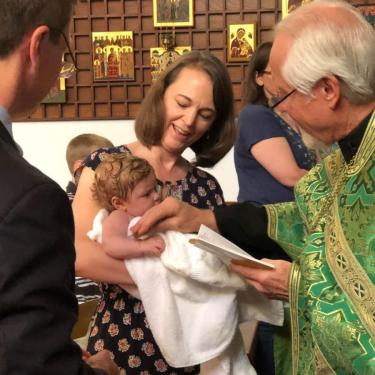
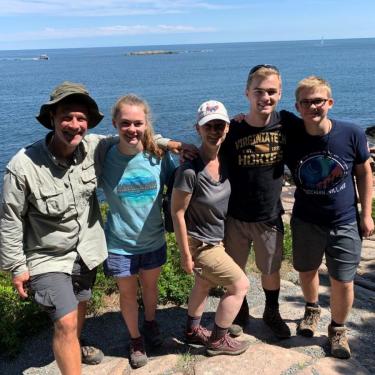
“When our own three children were small, I took a break from full-time work and worked occasionally as a substitute in several public libraries in our community. Eventually, I went to work at a public library that was in a more underserved community, a community that has many immigrants, many of whom speak English as a second language. In that setting, the public library becomes not only a place to pick up a great book to read, but it serves as a social services hub. Much of my work involved connecting people to resources through technology. In many instances in life we might say, “Just Google it.” Well, many people have limited internet access or limited technological knowledge. We certainly saw that during the COVID pandemic when kids who didn't have internet access would come sit in library parking lots to get free wifi so they could do their school work.”
Axia!a
Alexandra Sedor is our Woman of the Work, nominated for her work as a librarian in the public sphere. You see her here at work in the Baltimore Coutny Public Library masking from COVID in January 2021, and hanging out with the library mascot in May 2022. We asked to tell you why libraries play a vital function in our society:
“Public libraries are one of the few places you can go in America where no one expects you to spend money. I'm a little obsessed with them, because they are essential in a world where opportunities are getting smaller for many people. Libraries still play such an essential role. I've always felt that public libraries are America’s greatest institution. People don’t realize the role that they play not only as a place to get the next bestseller, but also as a center of information.
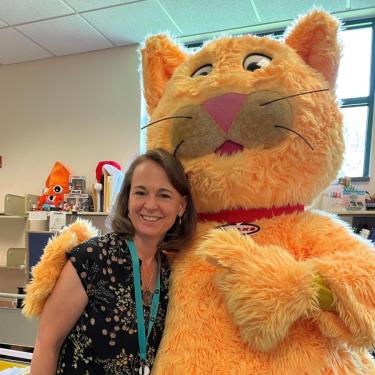
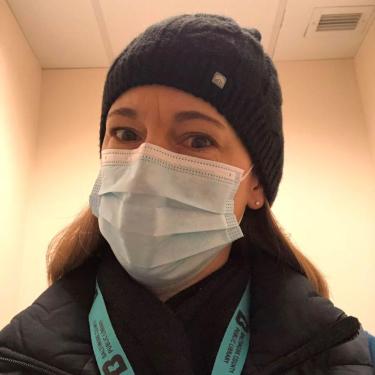
“In a library everything is free and you don't have to have any clout or privilege to be there. In our society right now, even for a simple job at Walmart or Amazon or Target, you can’t just go to the store, fill out the application, and hear whether they want to hire you or not. Now everything happens through an online portal, and that can be a real barrier for many people. It can be a technological barrier, it can be a language barrier, or a barrier of access. For elderly people who are trying to apply for benefits, all of those applications are now online. That means that if they don't have technological skills, they can't access any of that. So I would estimate that when I was in the public library 80% of my work day was connecting people to resources through the use of technology. For me, that was always kind of the driving force—connecting people to information. In our society, where opportunities now seem to be getting smaller, the library is a kind of last stop where, no matter who you are, no matter what you believe, no matter what your political persuasion is, you can come in and find help, regardless of any differences or similarities that we might share. In American society, it’s one of the last institutions filling that service role.
“During the COVID period, the public library system where I worked actually received a grant to get a social worker on staff, because we were encountering so many people who had issues that were beyond the purview of what we could do to help. As a librarian, I can't necessarily help you if you're getting kicked out of your apartment or need a lawyer. We had so many struggling customers, so the social worker was needed to help with some of those more in-depth needs.”
As always, we asked our Woman of the Week, Alexandra Sedor, to tell you about her morning routine. You see her here with her husband, Joe. She is also sharing her icon corner with you:
“My morning routine has changed a lot recently. In 2009 I was diagnosed with a neurological disease called Neurofibromatosis Type Two. Basically, I have tumors that grow all over the nerves in my body. I have tumors on both ear nerves, and upwards of 12 meningiomas in my brain. They're benign, but the tumors grow right around the nerve, wreaking all sorts of havoc. After I contracted COVID in 2022, my overall health took a turn for the worse. The good news is that some things are finally improving, but the bad news is that it's taking a long time. So I had to take a medical leave of absence from my public library role and I am currently in a phase of rest and recovery.
“I used to get up and go drink my coffee, then jump in the car right out the door, without really stopping to pause. But lately, my illness has really taught me (forced me?) to do things a little bit differently. I try not to look at my phone right away as much anymore. Instead, the first thing I do when I wake up is thank God that I'm still alive. I know that may sound funny. But with the amount of health issues I've had, I wake up in the morning and think, “Another day. Wow. What a gift.” Or at least I TRY to think that, you know —I try for that to be my first thought. And then, honestly, the next thing I do now is go outside right away, no matter what the weather.
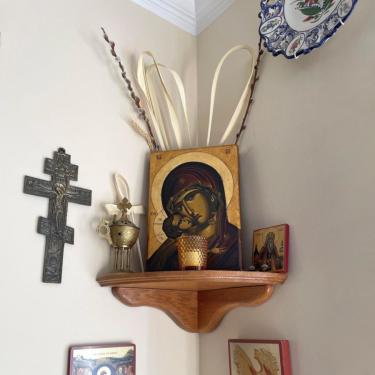
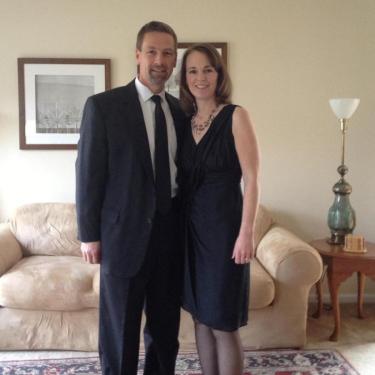
“After having COVID, I developed awful insomnia. I just couldn't sleep. I was tired but wired, because my nervous system was so off-kilter (also known as autonomic dysfunction!). In searching for solutions, I learned that our human circadian rhythms are controlled by light exposure. To try to improve sleep, the best thing you can do for yourself when you wake up in the morning is go outside for 10 to 20 minutes and get real light in your eyes, not from your phone. So my typical morning routine now, as soon as I wake up and thank God that I'm alive for another day, is to go drink a big glass of water and then go outside and get that light in my eyes right away. My neighbors have gotten used to seeing me on my front porch in my bathrobe with my big glass of water, getting that light into my eyes. I look really funny in the wintertime as I wear my puffy winter coat over my pajamas. This practice has really helped me to greet the day in a more peaceful way as opposed to jumping right into it the way I used to.”
Thank you, Alexandra!


